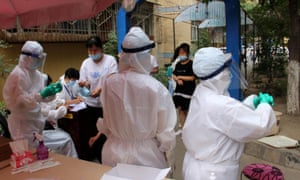08:49
In India, a video showing pigs roaming freely in a hospital that treats coronavirus patients in Karnataka, south India, has provoked shock. Equally alarming was that people at Kalaburagi hospital appeared to be used to the sight. No one stopped dead in their tracks on seeing the grunting pigs and piglets. The pigs , who seemed very much at home, were later tranquillised and removed.
While stray dogs in government hospitals are not unusual, pigs mark a new low. The incident has highlighted why even Indians who are not affluent avoid government hospitals and are prepared to pay for a private hospital – the low hygiene standards.
It also explains why some 11,000 out of 15,000 beds set aside for Covid-19 patients in the capital New Delhi are lying vacant while private hospitals are telling coronavirus patients to wait for days because they are full. If it’s not stray dogs and pigs, it’s the state of the toilets in state hospitals that frightens people.
The video emerged at a time when Karnataka is experiencing a surge in cases after initially managing to control the spread of the virus. The state now has the second fastest doubling rate in the country and close to 60,000 cases in total. While the national average of doubling is 20 days, in Karnataka it is 10 days. The rise in cases has prompted fresh lockdowns in several areas, including the capital and IT hub, Bangalore.
In evidence that India’s medical infrastructure is too decrepit to cope with the pandemic, monsoon rain last week flooded Osmania hospital. A video showed medical stuff using sandbags and mattresses to block the flow of water. Yesterday, coronavirus patients in a hospital ward in Bareilly in north India were startled when rain water gushed like a waterfall through the ceiling from a damaged pipe.
A former federal health secretary, K. Sujatha Rao, tweeted: “No wonder we are busy constructing temples. So much easier than managing govt hospitals. So shameful”.
India has crossed the one million mark and virtually every day sees a new ‘highest-ever’ single day spike. Sunday saw a new record with 40,425 fresh coronavirus cases in 24 hours.
08:37
07:59
In Cyprus there are mounting concerns over the number of asylum seekers testing positive for coronavirus at checkpoints dividing the war-torn island.
The Greek Cypriot health minister, Constantinos Ioannou, says authorities in the island’s internationally recognised south have registered a growing number of infections among migrants crossing over from the breakaway Turkish-run north.
Crossing points between the two sectors reopened in late June after three months of closure due to coronavirus restrictions. Health officials point to at least eight Syrian migrants testing positive for the highly contagious virus in the last week.
“The virus is still here. We have not got rid of it as many think,” said Ioannou, emphasising that Covid-19 tests were being conducted at crossing points along the 120-mile UN-patrolled ceasefire line separating the ethnically split state.
The route from north to south is a well-trodden path for migrants and refugees seeking asylum in the Greek-administered EU member south. Most are believed to cross over to the Mediterranean island from Turkey – where infection rates until recently had passed a 1,000 a day.
Migrants seeking to evade detection attempt to traverse the porous dividing line by circumventing checkpoints and taking other more out of the way routes. But once they appear before Greek Cypriot authorities they are tested for the virus before being placed in reception centres.
Cyprus has so far managed to keep the virus in check, recording fewer than 1,000 confirmed cases and 19 deaths. The north has registered 121 cases and four deaths with the territory’s own health minister announcing three new cases on Sunday.
Updated
07:26
Updated
07:11
07:07
Global cases pass 14.5m
Updated
07:03
07:00
06:57
06:37
Summary
06:24
06:09
Updated
05:42
Updated
05:23
Global cases near 14.5m

Internet geek. Wannabe bacon enthusiast. Web trailblazer. Music maven. Entrepreneur. Pop culture fan.




